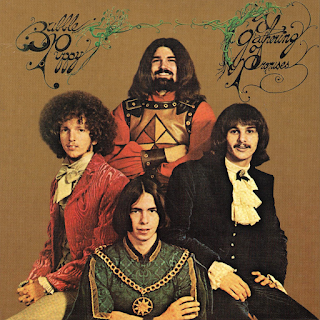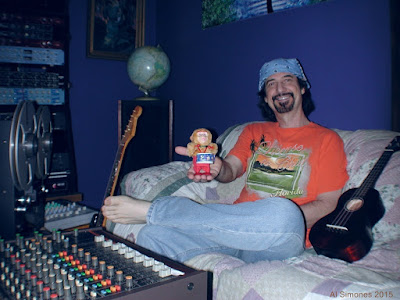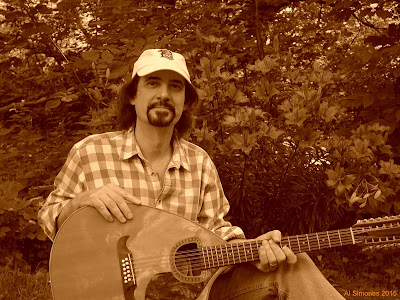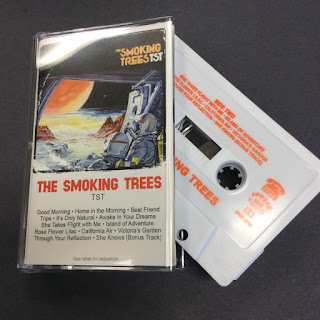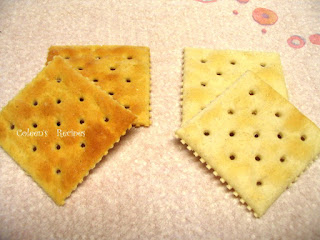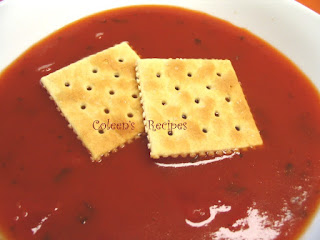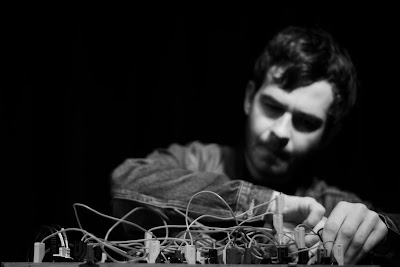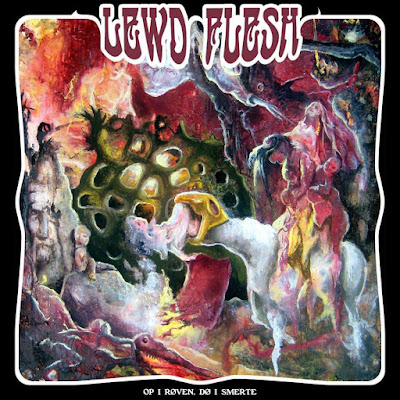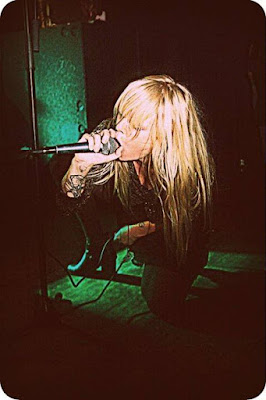Mainstream music is constantly playing on the radio but you want to experience something new, something that will have a profound effect on your mind. Come this way and listen to Simones' albums, which are all made in DIY spirit at his home studio in rural part of Ohio, where there is no coincident, that psilocybin mushrooms are growing strong on meadows around Al's home. His acid guitar tone trigger our nerve endings and make the whole journey way more interesting. Music without compromise. What he does is timeless and without a further hesitation should be ranked among the best "Acid Rock".
When and where were you born?
I was born in Cuyahoga Falls, Ohio (USA) in October of 1958. Cuyahoga Falls is located in NE Ohio near Akron, which is about 30 minutes south of Cleveland. I grew up in near by Perry Heights, Ohio.
How old were you when you began playing music and what was the first instrument you played?
My interest in playing music began when I was still in grade school.. probably 1967 ~ 68, when I was about 10 years old. I wanted very much to play the drums at that point and had been urging my mom to buy a set at Christmas. While I did get some drums.. my mother knew nothing about instruments and simply bought toy drums. The toy drum heads were just made of thin plastic and soon had holes in them, making it impossible to practice. A bit later I found myself enjoying the bass guitar lines in music.. and soon aspired to play the bass guitar.
I met a kid on the school bus who said he played the bass guitar. Sharing a love for music, we became friends and I soon was visiting his home to check out that bass guitar he told me about. While there, he tried to sell me a Teisco 6-string guitar for $10. However, I only had eyes for the bass guitar and declined his offer. He wanted rid of the guitar.. and kept dropping the price in effort to convince me. After several price drops.. and some arm twisting on his part, I agreed to take it at $4.
Once I got the guitar home.. I started warming up to it a bit. Still, I didn't have a clue on how to play it. My parents were hard-core "Country & Western" music fans.. and my step-dad in particular had outright hostility toward Rock & Roll music (and the "long-hairs" who played it). In fact, I once made the mistake of leaving my stack of 45rpm records inside of the stereo console in the living room. I later found them all broke in half.. and thrown in the living room fireplace. In spite of that environment, my rock & roll spirit was not stifled. I continued on with the guitar, and managed to teach myself some riffs that could be played on one or two strings. I think the first one was "25 or 6 to 4" as recorded by the band "Chicago".
A friend of mine who lived just across the street was lucky enough to go to a private school where his dad was a teacher. Eventually he began getting free guitar lessons there as part of his studies in music class. It was there that he learned to play "The House of the Rising Sun". When I heard him playing that one.. I grabbed my handy dandy Tiesco guitar and convinced him to teach me how to play it. It was my first song using actual chords. From there.. I simply began re-arranging those chords to create other melodies. It was my humble starting point.
What inspired you to start playing music?
I think by 6 ~ 7 years old I was already addicted to the radio and spent plenty of time listening. I would take the small transistor radio with me into the bed at night. Even when I was told by my mom to "go to sleep", I simply turned it down low and put it on the pillow near my ear. I had a long list of favorite songs, and knew who performed them. I'd tell myself.. if the next song isn't one I liked.. I'd turn it off and go to sleep. But, sure enough it would be a good one, and I would repeat that until I was just too sleepy.
There was a school owned baseball field near our home where many of us neighbourhood kids would hang out, riding our bikes up and down the surrounding trails that had been created by the older kids hill climbing on their dirt-bikes. There was a small pond there as well.. so we would skip stones and catch tadpoles in the summer and ice-skate there in the winter. One summer afternoon a garage band set up on the paved basketball court that was also located in the baseball park. It was about 1966, so they had the cool haircuts.. and fuzz tone guitars. Having already been an avid music lover.. seeing that band was a very big deal for me and made a lasting impression. I think that having that much passion for music at such a young age was a pretty good indicator that I was gravitating toward becoming a musician.
Were you in any bands before recording your solo material?
The short answer is no. While I had an early start at the guitar, I guess I didn't have the discipline or confidence in myself in those early years to keep progressing. I wanted to be able to break out of chords and into soloing. I'd watched others doing it, and it just seemed beyond my abilities. It was hard to imagine how they could remember where all those notes were, while putting them together so nicely.. and at such speed. I felt at that time (the 1970s) that if I couldn't play a solo for the song, then I just wasn't good enough to be in a band. (I should mention that as an adult, I still love tasteful well placed guitar solos, however.. much of my favorite music has only brief solos, or no solos at all). Returning to the point.. by the late 1980s I decided to make a dedicated effort at improving with the guitar. Once I finally learned some basic solo improvisation skills.. I went straight to recording as a solo artist.
When did you begin writing music? What was the first song you wrote? What inspired it and did you ever perform the song live or record it?
When rekindling my efforts to improve at the guitar during the late 1980's as I've just mentioned, I began practising improvised soloing over top of rhythm guitar tracks that I would create by recording myself on a standard cassette recorder. I should note that it sounds different listening back to your performance than it does when you're actually playing it (at least that's my experience). So I needed to find a way to hear and analyze what both of my parts (rhythm and lead) sounded like together. I didn't have the luxury of a multi-track recorder at that point, however I did have a Pioneer RT-909 stereo reel-to-reel tape recorder.

While I had previously only been using it for standard stereo recordings, I remembered that it had a "sound-on-sound" option, and decided to put it to use for the first time since having owned the unit. In brief, a stereo recorder is simply 2 tracks (L + R). This particular reel-to-reel allowed for recording one track at a time in mono. You can then move one track over to the other side.. while adding a new
track. You can keep going back and forth from left to right, then right to left, adding something new each time. It's a very primitive way of doing it, but it was what I had at my disposal.
So.. once I made the first two track instrumental recording and played it back.. I thought "Hmmm, maybe I could just throw a quick song together. There's nobody around to hear how bad this is likely going to sound.. so I don't have to feel self conscious, or embarrassed." While I'd never written a song before, I just put together some chords and arranged a few changes within the song. Then I quickly come up with some lyrics that could be phrased properly over the chords. The whole thing was done in a couple of hours. The song was called "Purple Frogs".
While it was certainly nothing that would spark a new trend in the music industry.. It wasn't the most terrible thing I'd heard either, and was indeed quite "trippy". I played it for a friend who had already played in a number of bands.. and I could tell that he was genuinely impressed. I felt that I could do better if I were to put more time and effort into making a song, so I went out and bought a 4-track portastudio soon after.
The following recordings eventually became the first album entitled "Corridor of Dreams". The very first song "Purple Frogs" wasn't included on the album. Since I've never played live.. the song was only heard by a few people.
Your music is resting in the early '70s, and not in the time when you recorded it. What were some influences? You must have been a big fan of heavy psych. Where did you get all the long "forgotten" records?
Being an impressionable adolescent during the late 1960s and early 1970s (when popular music was exploding with diversity and creativity) has certainly made an impression on my musical tastes, and by extension my own sound as a musician. I don't intentionally try to make music that sounds like it's from the early 1970s.. it just comes out that way (and I'm glad for that). If I were to try to create something more contemporary sounding, I would have to make a conscious effort. I may be able to do so.. but quite honestly I have no interest in doing that. I just prefer to create music that comes from my heart. My goal isn't to make a hit song, or become famous. I value music as an art, rather than a product that needs to conform to a trendy market.
As for being a fan of heavy psych ... I am indeed. But my my taste in music is quite eclectic. I also enjoy very mellow music, vintage soul, as well as 50s, 60's and early 1970s pop rock. Even as a kid you would find variety of styles in my record collection. A short list off the top of my head would be .. The Rascals, Steppenwolf, Paul Revere and the Raiders, Three Dog Night, Grand Funk Railroad, The Temptations, Alice Cooper, Tommy Roe, Deep Purple, Uriah Heep, Tommy James and the Shondells, Black Sabbath, Yes, Led Zeppelin, James Gang ... and of course my all-time favorites Jimi Hendrix and The Beatles.
To your question regarding where I obtained my records. Initially I relied on the local department store "Topps" that was within walking distance of my home. Of course any opportunity I had to get to other record stores I would surely take advantage of. I was truly obsessed with music (Not a bad obsession I think).
I was adventurous with music even as a kid. I remember buying a copy of the UK LP by "Velvet Fogg" that I had found in Topps dept store, and later a copy of one of the "Guru Guru" albums that I had found at another local shop called "Strange Daze Music". I wasn't really knocked out by those albums at the time, but was indeed experimental enough to spend what little bit of dough that I could muster as a kid. I remember picking up a copy of the "Trapeze" ~ Medusa LP.. which I really loved (still do). My copy of the first album by "Montrose" was a staple for me as well. Of course we can't forget Robin Trower.. those first few albums of his were also standards for my friends and I.
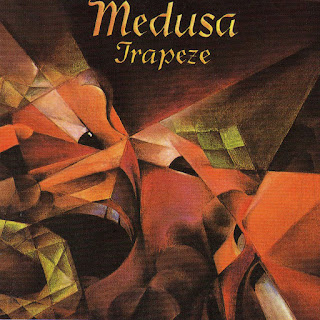
As a young adult, I continued looking for interesting bands.. which brought me into albums by Three Man Army, Sir Lord Baltimore, Bang, and one of my all-time favorites "Bubble Puppy". By the 1980s I found other like minded folks whom I would exchange tapes with and do record trades via the mail. At that point I started finding some of the more exotic collectable stuff. It was a great way to discover interesting music, and share that adventurous ear for music with others who were like minded. This of course all pre-dated the internet we all enjoy these days.
Did the local scene have any role in shaping you as a musician? Did any local bands have an impact on you?
I think so. Ohio was exploding with local bands at the time, and it seemed that every third person had a guitar or other instrument in their home (whether they could play well or not). Looking back, I think that sort environment certainly seemed to put musicianship within ones grasp psychologically. There were local garage bands that my friends and I would ride our bikes to watch (literally practicing in their garage's). Sometimes there would be a back yard party in the neighborhood featuring a live band. About a half mile away from our house there was a place called "Myers Lake Ballroom" who would have live rock shows on occasion. I once stood on the seat of my bike to see through a window to watch "Glass Harp" perform. It was certainly a musical milestone for me. "Glass Harp" were one of many great local bands from this area.. and I was always in awe of the brilliant Phil Keaggy's guitar playing.

There was a very heavy local band called "Left End" that I used to see often, and was a big fan. They did release a number of singles, and an album on Polydor. While the album is decent.. I think it fell quite short of capturing the power and energy of what they were live during the mid 1970s. I'm also quite a fan of the "Human Beinz" who were from this area. There really is such a long list of good bands from here in NE Ohio. I feel lucky to have grown up in this area.
Who were members of the band, when you started to record your first album Corridor of Dreams? I heard that most of the stuff is played by you?
Yes.. for the most part I recorded that album alone.. there was no band. The song "Shot Down" was a finished track, but I thought it might do well with some drums. I called a guy that I had recently been introduced to (Doug Riley), and he agreed to add a drum track. While I had a sense that he wasn't much into the song.. he was kind enough to do it for me. I had only one open track left on the tape.. so the drums were recorded in mono using a single mic sitting on a pile of unfinished laundry there in his basement.. and then simply added at a low level in the mix. Some months later I invited him to a jam session with myself, and a bass player I knew (Chris Bell). It was a one-off session which I recorded. From that recording came the "Purple Jam" instrumental that was added to the "Corridor of Dreams" album. The rest of the album I performed alone.
You've been a big part of so called DIY culture, where you actually embody a complete process of recording and releasing music.
At the time of making the first couple of albums, I was unaware of such a scene. I was simply on my own time line and started recording once I thought that doing so was within my reach and ability. I had some records in my personal collection of obscure 60s and 70s bands that were pretty raw and primitive in their production and rather liked the honesty of them. I felt that my lack a studio equipment was not an obstacle.. and had no problem just making the best of what I did have. I simply wanted to realize my dream of making a record, and didn't mind if the recording quality was less than stellar.
Quite honestly, when I finally released the first album.. I expected to get plenty of negative review and was prepared for it. In reality however.. the scene welcomed the album with friendly positive review.. and even a bit of adulation. It was far beyond my hopeful expectations. I'm really very grateful to those folks who have supported those albums. I truly am.
What was the writing and arranging process within the band? Did anyone else in the band write?
Quite honestly, I never really had a "band" per se. At least not in the sense of writing songs in preparation for live performance.. or to become recognized as a band to the public. My primary goal was to keep recording solo material. However, I did like to have occasional jam sessions here in my home studio,
Initially I found it difficult to find musicians whom I could relate to musically.. and actually lost interest in jamming for a while. However, I would meet such a variety of folks at the record shop, and engaged most anybody in philosophical, or musical conversations. Over time, I made some very good friends who were also quite good musicians.. and whom with I shared similar musical values. Eventually we started having weekly jam session at my home. The goal was simply to enjoy ourselves, and to record the jam sessions with the understanding that some of the material may later find it's way to vinyl. That line up was .. Kevin Chatham (drums), Andy Conrad (bass & vocals), Rich Karlis (Rhythm guitar) and myself (lead & rhythm guitar). As it turns out.. a few of those jams turned up on the fourth album "From the Electric Cornfield".
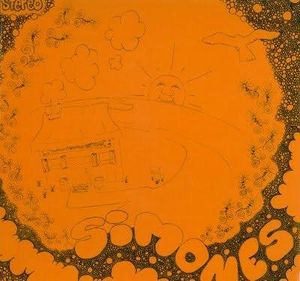
Where was the “Corridor of Dreams” LP recorded? How long did the sessions last? Would you share some recollections from the sessions? How pleased were you with the finished product?
Most of the "Corridor of Dreams" album was recorded in an apartment I was renting just outside of Columbiana, Ohio. Actually it was an old two-story house converted into two separate dwellings, both with their separate entrances. I lived in the upstairs half, with a good view of the back lawn and the nice rural wooded area out past the lawn. Just the sort of place a person could could have a small garden should they be inclined.
My former wife was working at a nearby ice cream shop. So while she was gone serving ice cream cones, I would set up the gear in the living room and do my recordings there. It was really the only time I could do so without noises, and distractions. I would work about 4 to 6 hour sessions at a time. The time passed so quickly while immersed in making those recordings. Hearing each song come to life.. one, by one was quite a joy.
By 1991, we finally bought the house where I'm currently living. It's an old farm house that is even more rural than the apartment was. For me.. the ideal situation. I could never live in the city, or even in town where I would be side-by-side with many other houses. As it is now I can have a jam session into the late evening anytime I like.. and have done just that on many occasions. It's here were the last couple of songs were recorded for "Corridor of Dreams".. and where the jacket art was designed, and assembled individually by hand.
You started your own little label to release all of your albums. How many copies of albums came out?
1992 Corridor of Dreams (Purple Phrogg Records) ~ 300 copies
1993 Corridor of Dreams (Peyote Records) ~ 1000 copies
1994 Enchanted Forest (Purple Phrogg Records) ~ 500 copies
1998 Balloon Ride (Purple Phrogg Records) ~ 500 copies
2009 From the Electric Cornfield (Purple Phrogg Records) ~ 285 copies
How did the distribution looked like?
Largely they were sold wholesale to dealers in quantities of 10 ~ 15 at a time. A few of the larger distributors would buy 25, or more at time until the pressing sold out. I'd say maybe as much as 75% of these albums went to Europe.
What can you tell us about cover artwork?
The jackets were designed on my own here at home. For the first album I asked a friend "Scott Tammaro" to take photos of myself as you see on the "Corridor of Dreams". (A very good photographer challenged with the task of shooting a homely subject). I then designed, and hand drew the rest of the jacket.
For the "Enchanted Forest" album there were four slicks to design due the fact it was a gatefold jacket. I did all of the art and photography myself on that one. It was the most labor intensive of all the albums. The front of the jacket is actually a photograph of artwork I created using clay. The colors of the clay were chosen and placed in the art with the understanding that the finished work would be photographed in black & white.. then printed as a negative image. Once the image was printed as negative, the darkest clay colors would be seen as the lightest colors. The final step was to put this artwork behind a green acetate widow which would really make the light colors pop.. Once completed.. it created a luminous ..almost 3-D effect.

I didn't have the luxury of having a die-cut machine, so I had to cut the window opening of the front of jackets one at a time by hand with a utility knife. It took quite some time, and I think it truly put me at risk of developing carpal tunnel. Of course, I did complete the project and fortunately my hand is ok. Afterward I glued in the green acetate windows, and then the clay art image print behind it. Gluing in the other three slicks was a breeze by comparison.
It was indeed a labor of love project.
The "Balloon Ride" LP was also a gatefold jacket. Two of the images I sourced from antique drawings that are over 200 years old that I was quite fond of. The back of the jacket is a photo I did myself, featuring a 1958 Stratocaster, a 1960s Vox wah wah pedal, and early 1970s "Camco" drums. The photo was taken here in the studio were these records are recorded.
The "From the Electric Cornfield" album jacket art features a pencil drawing I did specifically for that release, as well as a relative photo montage I put together for the back of the jacket.
Yes, it's a lot of work doing jackets this way.. but I prefer the personalized vibe of the finished product. The music is indeed personal and genuine.. so I think the jackets should be as well.
What can you say about the material on it?
I'm not sure were to even begin an answer for this question.
However, to make an effort I'll address it this way. As a youth I discovered that some of the music that I valued the most, didn't really sound very appealing to me at first listen. It seemed that I had to give it a chance to come into focus before it would reveal it's beauty. To offer an analogy.. if you've ever seen those art prints that look like nothing more than a page of random dots, but you continue to look through them as if you're daydreaming, or allowing your eyes to go out of focus.. suddenly you see that in fact there is an interesting 3-D image that was previously invisible to you. I think that some music is the same.. and while I can't know how others perceive my own music, I imagine the material on my own records as the sort that must be allowed to come into focus before it's true nature is revealed.
Would you suggest Corridor of Dreams is a conceptual album?
I haven't used that term to describe it previously, but I would agree with such an assessment. My previous answer is pretty much in line with that view as well. In fact think that many of the insights, and perceptions brought on during a psychedelic experience could be described as conceptual if an attempt to describe, or understand them was made in the usual state of consciousness. It's my view that the album isn't really something you find yourself whistling the melodies from.. while you're at your job making toothpicks out of logs. It certainly hasn't conformed to a standard formula. I think a professional music producer would think of it as a train wreck. I understand that the unusual structure and lack of hooks, or choruses would likely alienate the average music listener.. but then I guess this music isn't intended for the average listener. While I do very much like nicely arranged catchy rock songs.. I think that spiritually it keeps the listener earthbound, which is just fine. When recording this music however, I hoped to allow the listener to escape, and explore other dimensions.
Would you share your insight on the albums’ tracks?
"Peakin"
Among friends I'd known in the 1970s here in Ohio.."peakin" was the word used to describe the "apex" of the psilocybin mushroom experience. I thought if one could capture that feeling in sound.. it might sound like this track.
"Colors"
A virgin mind about to embark on a psychedelic maiden voyage.
"Look at Life"
Thoughts and considerations in regards to our human existence.
"Purple Jam"
This was an out-take of one of the early jam sessions held in my first house after moving out of an apartment. Quite flawed.. but it has a few moments.
"Shot Down"
Every once in a while we find ourselves at a point when things are going pretty good in life. Sadly, there are those.. for whatever reason, who want bring you down. In some cases it was somebody whom you had mistaken for a friend.
"Wizard of Time"
A sonic adventure through time and space.. via by chance meeting with a supernatural being who has great wisdom and insight to offer for a more than willing adventurous apprentice.
"Sinsemilla Morning"
With fresh seedless bud on hand, and the place to myself on a beautiful sunny Sunday morning.. the proper state of mind was achieved. With guitar in hand and fresh tape on the recorder, this was the spontaneous result. It was conceived, recorded and mixed the same day.. and of course appropriately titled.
"Fantasy Girl"
An expression of the joy of being in love, and appreciating one's good fortune.
Enchanted Forest is your second album, which came a couple of years later. What took so long to record this one? It's a bit different then your first one. How do you like it compared to the first album? Enchanted Forest seems to have more conceptual material on it. What's the story behind it?
I would absolutely love to be able to move song writing, and recording into my primary focus, but have so many other things to attend to. There are stretches of time when I could work on writing and recording nightly.. then other things would come up that would demand my time, so I would be away from it for a while. During the early 1990s when "Enchanted Forest" was recorded, I had far more free time than I do even these days. However, writing the songs, and usually playing all the instruments, while also being the recording engineer makes an already very time consuming process even longer. But I really love it just the same, and will continue to do it that way as time allows.
Even so, I thought two years was fairly reasonable. Consider successful artists who have no worries regarding paying the bills due their success, and who's primary responsibility is to create music. It's common even with them that years pass between albums.
In my view "Enchanted Forest" is a continuation, progression and expansion of the first album. On "Corridor of Dreams" I did this, that.. and the other thing.. until I had enough material for an album. Once a new album was started.. I had room for more ideas to experiment with. Additionally, I think my abilities in playing, and recording improved a little as well.. which would come into play. However, there was no preconceived differences between the two albums. There are things on both albums that I would do differently if I were to do them now, but there are other things on the albums that I'm quite pleased with. I couldn't favor one over the other.
Your guitar work is what I would call a guitar heaven for a fuzz psych head like I am. What gear did you use and maybe what guitarists you enjoy listening to?
That's very kind, thank you for that. Well, for the first album I had very little gear to work with. I used a 70's Gibson SG, and a 60's Gretsch Corvette (which I had found as a basket case fixer-upper at a local flea market, and restored myself). As well I had an off-brand acoustic 12-string which I would also use a 6-string.
During the time I was working on the second album "Enchanted Forest", The collection began to grow. I was bitten by the gear-bug.. and started buying and selling used guitars, amps, and effects at the record shop.
Eventually I was attending trade shows as a dealer with this vintage gear at the Columbus, Cleveland and Pittsburgh guitar shows. Getting in early to set up as a dealer allowed for early shopping & swapping. My collection of vintage guitars, amps and interesting vintage obscure effect pedals continued to grow.. and added a new dimension to the pleasure to recording these albums.
My "gear-head" focus at the time was more for guitars, amps.. and vintage effects. I hadn't put much money into the recording equipment itself. As well, I hadn't invested much time into the technical aspects of recording. I simply did my best to get tones that I liked onto tape. While I make it a point to avoid a slick shiny modern type of production.. I would like to improve on the production of future projects. While I've been silent in the past years, I have been researching and tracking down particular pieces of vintage analog gear for my home studio.. and I really enjoy that as well. I think the future productions will be improved, but will still be raw, and honest. I have no intentions of making modern sounding sparkly slick records.
As for guitarists that I enjoy.. it's really such a long list, and it's sure many will be left out. However, I think it's no secret that I'm a very big Jimi Hendrix fan. I also grew up seeing Glass Harp & Phil Keaggy.. and have always had great admiration and respect for his guitar playing as well. I've also had great respect and admiration for Robin Trower ever since picking up his first album when it was new. I love his tone, the moody atmospheres he creates, and the soulful vocals of his bassist James Dewar.
A few others that I can think of at the moment that are more contemporary would be.. Audley Freed, Michael Gurley, Ty Tabor, Joe Bonamassa and Eric Gales.
Two more albums followed, Balloon Ride and your latest From the Electric Cornfield, which came out about six years ago. Would you like to share story behind making them?
The "Balloon Ride" album was rich with many of the vintage instruments that I had managed to pull into my collection. The opening track"Majic Ship" featured a 1967 Rickenbacker 12-string electric that I was quite pleased with. (Sadly, I ended up selling that guitar.. as the neck on those are quite small and I have rather large hands). "Majic Ship" also included my first attempt at the drums. In fact the "Balloon Ride" album.. unlike the previous albums had a number of tracks with drums.. largely played by my very good buddy "Kevin Chatham". (whom I think is an exceptional drummer). Not all of "Balloon Ride" included drums however.. as some of the songs sound better without them (in my humble opinion).
Of course it must clear that I very much like drifty, dreamy psychedelic music as reflected on the first two albums.. but I also wanted to record some heavier psychedelic tracks to be part of the third album. The addition of drums on "Balloon Ride" allowed for me to do that. This continued even more so on the fourth album "From the Electric Cornfield". About half of that album album was recorded live here in the studio.. where most of our jams were pretty heavy. I can remember when moving into this old farm house years ago, thinking that this place has never heard sounds like it's going to. A few years later we did shake the sturdy sandstone foundation with some rather unusual music. If there were any ghosts hanging around this old place, I think we likely frightened them away.
Our friends at Headspin Records made a really nice Simones 20th Anniversary 4 LP Box-Set Edition 1992-2012…
Yes, Johan over at Headspin was very kind to make an offer several years prior to do some sort of re-issue on vinyl. His was one of a number of offers I'd received over the years. I had embraced a mindset since the beginning to stay completely independent.. free of third party involvement. I had no preconceived expectations of ever becoming famous by recording this kind of music, so I quite honestly didn't see the point in doing it. My intentions were simply to make this music that I personally found interesting, then press up a few hundred copies and move on to the next one.
Completely by chance, Johan and I crossed paths once again in 2012. During that communication he told me that he really thought that more people should hear this music. He went on to suggest doing a box-set, and tempted me further by offering creative control of how it would be presented. Not having that option would have surely been a deal breaker for me. Feeling a bit nostalgic having realized it had been 20 years since the first album. The idea was quite tempting, and I decided to go with it.
Johan was really great to work with, and he truly kept his word every step of the way regarding my "very particular" visions of how it should look.
I've received so many compliments on that box-set, and of course I'm quite proud of it myself. If not for Johan's vision, and his tugging on my shirt-tail about it.. this important milestone in my life would not exist. While I've expressed my appreciation to him privately, I'm happy to have this platform to do so publicly. Thanks again Johan.
Would you discuss some of your most memorable moments in your music carrier?
Having not had a band for live performance, I don't have stories of meeting my bandmates while being a roadie for "Bubble Puppy".. or having jammed with "The James Gang". No stories of having missed our gig opening for "Three Man Army" because our drummer was trippin' too hard on shrooms back stage. My musical carrier moments are a bit more humble.
Holding a finished copy of "Corridor of Dreams" in my hands for the first time back in 1992 was quite a big deal for me. While the same is true for each subsequent album (including the box-set) .. the feeling with the first one was quite special as you might imagine.
To my surprise .. soon after the release of "Corridor of Dreams" I began getting a lot of positive feedback. There was quite a bit of fan mail from many countries, and even folks who were asking for autographs. That seemed a bit surrealistic for me. I never figured there would come a time when people would ask for my autograph. I remember a guy in particular who had driven about 5 hours to the record shop just meet with me in person and get an autograph. During our conversation I learned he was an attorney. It's hard to imagine that with his profession he would have the time.. let alone such interest.
Being asked to participate in radio interview for Stony Brook Collage (New York) after the first album was released was quite flattering as well. While not as high profile as a guest spot on the Jay Leno show, it's was still rather complementary. Certainly more than I ever expected.
How about gigs?
I've never played live. Had I applied more effort to the guitar earlier in life.. I surely would have been doing live shows. However, being a late bloomer.. my values had changed. I prefer the privacy and freedom of creating music with a tape recorder. I think live shows would have been fun.. but the good side of doing it this way is I have no pressure of judgemental eyes, worrying about a good live mix, worrying about having only 12 people showing up to the show, or having beer bottles hurled at the stage by a guy yelling "play Freebird"!
Would you mind answering question about psychoactive substances? Did in your opinion psychoactive or hallucinogenic drugs played a large role in the song writing, recording or performance processes?
Yes, I would say it has. I should first point out that I'm a family man these days, and no longer partake.
However, when I first tried psychedelics in 1977, I found that it was different than I thought it would be, and that it had even surpassed what I had heard and expected of it. While I hadn't become an instant philosopher with only the first experience, I quickly realized it was certainly something for those of us who are thinkers and explorers. I soon understood that the experience was very much subject to environment, and when applied while in the right environment.. offered fantastic benefit without negative side effects as the stigma would have us believe.
During the experiences, I had the overwhelming feeling that psychedelic substances are not accidental, or coincidental in the way that they effect us.. and that my personal experience was meant to be. Without hesitation, I would say it has been an important milestone in my life. While many teens did it just as another way to party with their friends.. it was not the case with me. I was genuinely a "seeker" and found it to be a bridge to see a more truthful look at the natural world, and at my own self. I took to it like a fish to water.
Taking it a step further, I believe that through history it has been one of the important ingredients contributing to the evolution of many of the higher species of life on earth.. due to it's ability to raise consciousness. Consider for instance that something as simple as the ability to understand that it's your own reflection you see in the water is a level of consciousness that was not possessed at an earlier point of evolution. It's sure that there are many more "awakenings" to come for us as a species ... if we can ever let go of the "memes" that hold us back.
For me personally, appropriate music is mandatory when taking such a journey. I hope that the music I've produced would be a worthy soundtrack for any kindred like minded spirits out there. These productions are truly a celebration of, influenced by, and meant to be a soundtrack for such journeys. I feel that it embraces only good karma, is genuine in spirit.. and takes the listener on a ride to places commercial music will not.
**Disclaimer: I am not suggesting that anybody break applicable laws in their country. This music has the potential to take a willing listener on mental journeys without the aid of any substances. Please be smart, be careful... and be safe.
What currently occupies your life?
My lovely wife and I have a little girl who is currently 7 years old. They are my primary focus. Girls need lots of attention, as I'm sure many of your readers can relate to. I find it to be quite a joy. Being a home owner with some land.. there's constantly a back-log of tasks that need attending to. The days just seem to zip by, and it's a good life. I'm living here in a peaceful quiet rural area, and very much enjoy it.
Are you still musically active?
I haven't been writing and recording for a while. However I do play the guitar almost daily. For me it's not a task or discipline to do so... it's an urge. While being attentive as father, husband and home owner as I've just mentioned.. it's difficult to lock myself in the studio for hours on end to work on new material.
However, I do have every intention in getting back to recording. In anticipation.. I've completely rebuilt my home studio. It's been a pleasurable hobby of researching, and locating cool vintage pieces of pro-audio analog gear that suite my tastes and needs. In some instances the gear needed repairs.. which brought them into my hands at a good price. I've enjoyed teaching myself how to do many of the repairs myself. I'm very much looking forward to bringing the newly acquired vintage recording equipment into use.
Thank you very much. Last word is yours.
I'm quite honored to be invited for an interview with your magazine.. thank you. While you asked me for in depth answers.. I hope I was able to respond in an entertaining and informative way.
I would also like to extend a thank you to those who have bought the "Simones" records over the years, and who have been so kind to recommend this music to others. I'm truly humbled and very appreciative. Please stay tuned ... there is more to come.
Interview made by Klemen Breznikar/2015
© Copyright http://psychedelicbaby.blogspot.com/2015





